
Women hold proportionally fewer sales roles than men and the number is dropping. The same researchers that investigated the personas of top salespeople discussed in my recent post also considered the differences between men and women in sales roles. The study estimated, for technology companies, “the sales force composition to be over 85% male.” Women have notoriously filled fewer positions in white-collar fields than men. For example, last year a report highlighted that “fewer large companies are run by women than by men named John.” This year, @CatalystInc discovered women only hold 4.6% of CEO positions at S&P 500 companies. Why are there few, and falling numbers of, women in these professional roles?
Velocify’s research report and companion piece to the “Account Based Selling: Stop Selling & Start Guiding” study, “The Similarities and Differences Between Men and Women in Sales”, revealed significant commonalities between the genders in terms of personality and skill set and notable deviations in those perceptions particularly influenced by external factors.
The Fisherwoman
Many surveyed women fell into the top-performing persona that makes up the Fisherman sales approach of my previous post with valued traits including patience and empathy. The question with the most significant differentiation between the genders’ answers was that on the favorite subject in school. While the majority of the women chose Language and English Studies, the top answers among males were History and Math. This question, thought to reveal the most about a potential salesperson’s perceptions and communication style, now becomes even more significant as it highlights a divide that starts long before career selection takes place.
The Female Perspective
Despite attempted awareness, gender imbalances in white-collar positions continue. The study found women consistently rated their levels of success in their careers lower than men. This is not due to skill level but rather the perception that women in professional roles tend to have. A survey participant stated “I find that in general, women are more likely to pass off success to their team or others.”
More women said they ended up in a tech sales position “by chance” than men, as women are less likely to be led to the industry in career guidance. In relation, an Open University poll this November found that many women did not follow a STEM career path because of lack awareness and role models. For sales, front-of-mind leaders are primarily men. For example, my own post referenced Don Draper as a stereotype for the successful salesperson.
It Starts Early
The differing paths for the two genders start early. Intel’s study this September found that still, “pink and blue toy categories are dominant in society.” It’s nothing new to hear that little girls are pushed to dolls and boys to building tools. What is new is the study’s finding that, even for toys geared to both genders, the boy version of the toy is more complex and, therefore, creates greater early interest and confidence in engineering skills.
Gender Imbalance Can Lead to Loss
For every girl with the ideal persona and talent to become a top salesperson that is led away from your field, you lose the opportunity for a stronger staff, improved innovation, and increased wins. For those still not hiring enough women, look out. Women are starting businesses at 1.5 times the national average, according to @womenwhotech. You might just be creating your own competitors.
Need more Proof? The Women in Sales Awards North America division released a informative infographic on the benefits of women in sales roles in their June 2016 issue. Read more facts by WIS and more about the great women in sales across North America: @WISAmerica
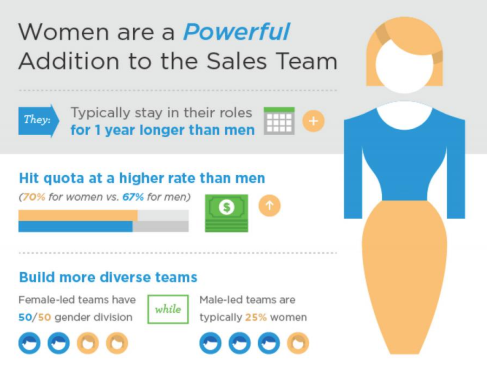
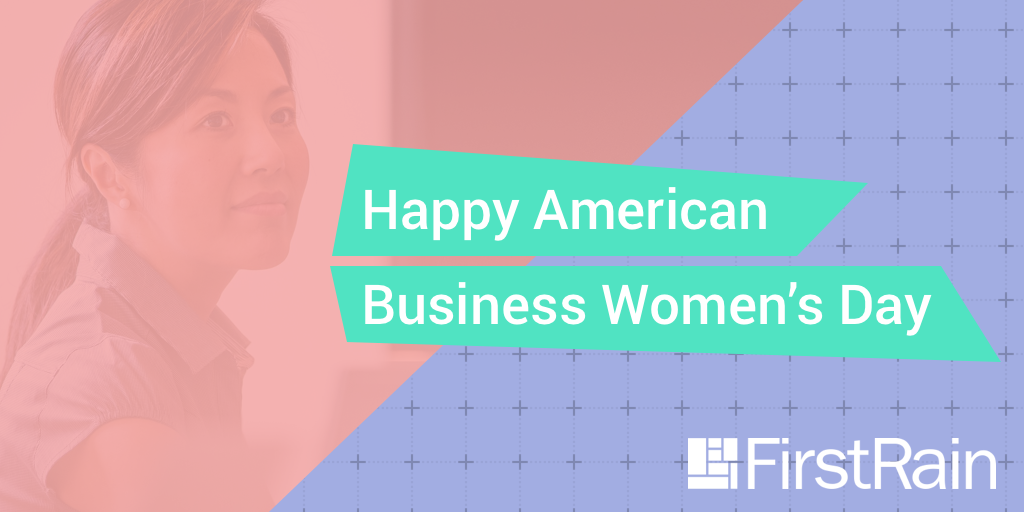
Today is National American Business Women’s Day!
The date marks the formation of the American Business Women’s Association on September 22, 1949. The holiday itself was first recognized in 1983. Since the association’s mission encourages businesswomen to support and recognize one another, we’d like to take a moment to look at the journey women in business have taken in America.
Before women were able to enter the traditional workforce, they found alternative paths to make a difference. Jane Addams in the late 1800s and early 1900s pioneered the idea of settlement houses with her Hull House, a beacon of community for those disenfranchised. Because of her non-profit business-style approach, Jane became the first American woman to win the Nobel Peace Price.
Throughout history, women revolutionized industries previously tailored to them as simply consumers, such as fashion and beauty. Coco Chanel, in the early 20th century, became the first designer to create fashion-centric clothing with jersey material and later, with the launch of Chanel No. 5, became the first to cross from the fashion industry into fragrance. In the mid-century, Estee Lauder founded her own beauty company and revolutionized marketing with the still-used “gift with purchase” deal. A modern day example, Oprah Winfrey built a media empire and international reputation.
Today, women are transforming previously exclusively male industries like finance, healthcare, and technology. However, challenges remain, as indicated by the mere 4% that is female CEOs on the Fortune 500 list this year.
To celebrate those female CEOs that are transforming the Fortune 500, let’s take a quick look at the competitors, market drivers, and regions that are spiking around these top Fortune 500 female CEOs, as detected by FirstRain’s Spiking Topics.
Fortune Global 500 #20 – Mary T. Barra, General Motors. Celebrate with @mtbarra
Fortune Global 500 #82– Virginia M. Rometty, IBM. Celebrate with @GinniRometty
Fortune Global 500 #127 – Indra K. Nooyi, PepsiCo. Celebrate with @IndraNooyi
Here at FirstRain, we are proud of our history of female executives. Our current CEO is YY Lee, who has two decades of experience in leading technology startups and global businesses. Penny Herscher, our former CEO and now executive chairman frequently discusses women and technology both in her speaking and on her blog. Our Managing Director, Aparna Gupta has played a variety of technical leadership roles spanning software engineering, content R&D, and product. These notable women, alongside many others, have helped shape companies like FirstRain, IBM, GM, and Pepsico to become leaders in gender equality in the workplace.
Now, that’s something worth celebrating.
Check out this historical timeline of entrepreneurial women in America made in partnership with Microsoft.

For decades, IT has been dominated by males, with women technocrats having limited access to boardrooms. However, this trend is changing drastically as women enter strategic positions across the industry. The increasing participation of women in the tech industry and their growing influence is commendable. Still, there is a lot work to do before we see ‘real’ gender equality in the technology sector.
ABI is doing the work! They are empowering women on technology, entrepreneurship, career development, leadership, and advancing gender diversity in the workforce.
GHC/1 was recently held in Delhi and the experience was quite motivating. The conference had approximately 485 women in attendance, crossing technological roles to non-technological roles and ranging from professionals to students to aspiring entrepreneurs. The center of discussions was technology, entrepreneurship, and achieving a gender-diverse technology workforce.
One of the most intriguing discussions was “Digital Revolution – How the customer is embracing the technology.” The panelists were Deep Kalra (Chairman, Makemytrip), Harmeen Mehta (Global CIO, Bharti Airtel), Sanjay Rishi (President, American Express S.Asia) and Shikha Rai (VP, Canon India), all experts in their domain. Discussion included how panelists are transforming themselves alongside the revolution in technology.
The discussion revealed how customers are the primary force behind the shift to digital transformation. In light of the fact that most people use social networks and digital interactive tools in their daily life, it’s reasonable for businesses to undertake digital transformation. Every business now runs on our smartphones. Companies are becoming more and more user and app-friendly to capture customers’ attentions. The role of social media also cannot be ignored. Tweets go viral in no time so target companies must acknowledge and, sometimes, take corrective measures for their reputation.
The session gave way to a Fireside Chat with Rentala Shekhar, Chairman of NASSCOM, who emphasized supporting a flexible culture for women starting families.
There was also a discussion by Bharathram Thothadri (Chief Credit Officer, American Express and Managing Director, RIM India) on “Big Data and the rise of Fintech.” Fintech, or Financial Technology, encompasses a wide of companies using software to provide financial services. The major examples in this field are companies like Paytm and PolicyBazar.com. It’s interesting to see how such complex things as deciding on fund investment or taking a policy have become user friendly with big data and technology.
On the innovation side, we had Meetul Patel (General Manager of Marketing and Operations, Microsoft, India). He made us realize how unaware we are of women inventors. Watch the discussion’s video here. The names that first come to our minds are mostly male. We hardly know of any female inventions. Does that mean women have not invented yet? No! You will be surprised when you Google to see the list of incredible inventions we (women) have done.
Another session of interest was “Role of Innovation in Entrepreneurship.” Aparna Gupta (Managing Director, FirstRain India) was the discussion moderator. To hear more of her thoughts, read her recent interview on business intelligence in a world of mergers and acquisitions, posted on CIO. On the panel were four women, all innovators, who spoke about how an innovation can change one’s life and the live
s of those around them. One such innovation, and a crowd favorite, was from Anusheela Saha. Saha designed solar powered school bags for children in poverty, so they can study at night. The bag has solar panels attached to the front flap and LED lights on the reverse. The bags are charged as children walk to school and throughout the school day.
My take away from this experience is that women should go for it with their business ideas. It’s ok to fail at first. But if you do not try, you will never learn!
The event was concluded by a workshop by the founder of Storywallahs.com, Mr. Ameen Haque. The “Art of corporate story telling” session explained that one should weave an honest story about yourself and your work if you want to be remembered for long. What do you remember most –math classes or stories from your grandparents?
Overall it was a splendid networking event where women got to meet and be motivated by the life stories of domain experts. I met with Dr. Vibha Tripathi (Founder of Swajal) and Mr. Ameen Haque in between the tea breaks and was fascinated by how modest, yet intelligent, they were in their respective domains. Looking forward to next year’s session!
Mehgna Puri, Senior Analyst, Customer Success
Chitra Singh, HR Manager
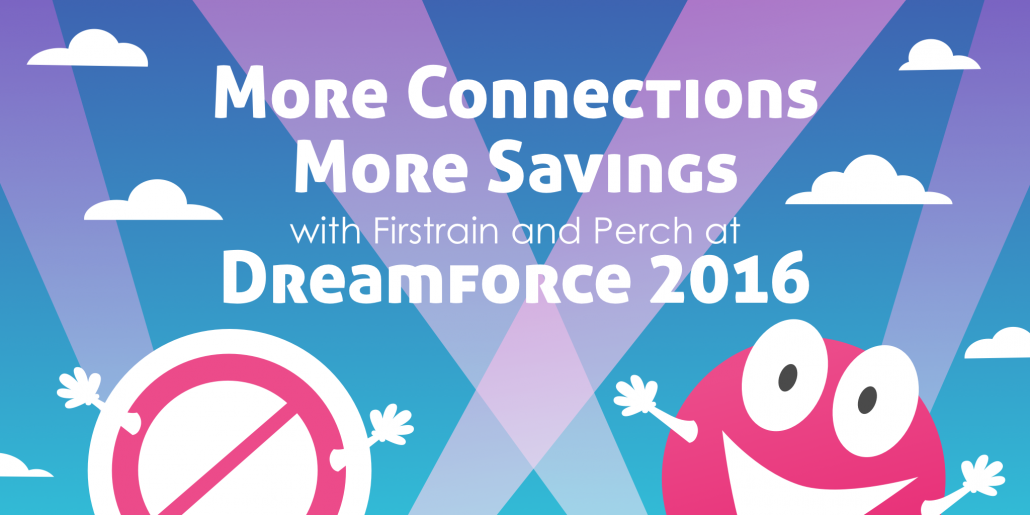
There are only 25 days until Dreamforce 2016! Recently on their blog, Salesforce pointed out how to make the most of your airplane hours on the way to Dreamforce. This inspired the FirstRain team to optimize other often-wasted moments of time that are part of the full Dreamforce experience – time spent digging for information and time spent commuting from hotel to event, event to hotel. Luckily, we found a optimization with hotel service, Perch.
We were first introduced to Perch through the Women in Tech Salesforce User Group as FirstRain has been participating in “Girly Geeks” events for over the past four years. Later, FirstRain and Perch realized that, when united, they could help you get the most out of your Dreamforce experience. The shared advantages of using FirstRain and Perch can easily been visualized in this infographic.
Networking is, at its core, socializing (perhaps with a drink in hand or via escalator rides up and down Moscone). There is no doubt, that at Dreamforce, you will have the opportunity to meet inspiring and knowledgeable individuals. Rather than waste time desperately researching to keep up, FirstRain can give you instant updates on market and industry topics around the world. Impress your peers with smart insights around the companies and industries they work in so you can spend more time connecting and less time looking down at pages of irrelevant search results.
Since we are both committed to your success at Dreamforce, every Dreamforce attendee booking their stay through Perch will receive complementary access to FirstRain through October.
Don’t forget to set up FirstRain on your mobile phone for on-the-go access throughout the conference.
Enjoy!

FirstRain COO, YY Lee, is giving a speech at Thomson Reuter’s Data Science Meetup “Rubber Meets the Road: What’s hard about deriving real meaning from data” tonight in San Francisco.
In her presentation, YY will share her expertise on deriving business developments, implicit relationships, and “meaningful insight” from vast swaths of online and social content across the global web. She will share FirstRain’s experience in addressing the following data science problems to deliver deeply personalized information experience to business professionals:
The event is being held at Galvanize in San Francisco tonight from 6:00 – 9:00pm. We are looking forward to meeting you!
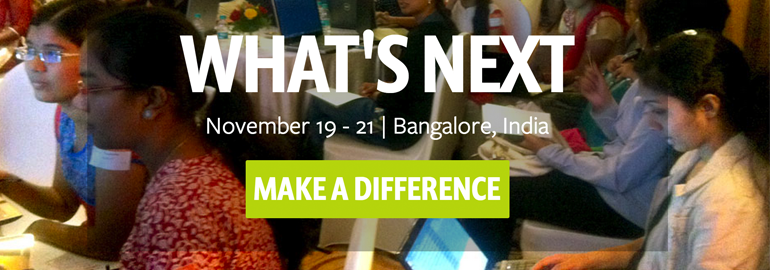
Author:
Ritu Parihar (with inputs from Neha Dahiya)
This year I had the opportunity to attend one of the tech world’s most prestigious conference celebrating women in computing, the Grace Hopper Conference (GHC), organized by Anita Borg Institute (ABI). FirstRain has a deep connection with ABI and I am glad I got an opportunity to attend GHC this year in Bangalore, India.
Our FirstRain CEO, Penny Herscher recently stepped down from the ABI board but continues to be actively engaged- in the spring she was the Master of Ceremonies at the annual Women of Vision awards and also moderated a panel on Male Allies at the 2014 GHC conference in Phoenix, US. Our Managing Director of our India operations, Aparna Gupta is also very involved in ABI as part of the India Council and has been a part of the Advisory committee and panels over the years. With our leadership team, committed to diversity and ABI’s primary aim to recruit, retain, and advance women in technology, participating in the conference is a great opportunity to further this important cause.
During my two days at conference, I had the opportunity to meet many women professionals and exchange views on various topics like technical acumen, team work, work life balance etc. The beauty of the conference is the fact that it creates a platform for collaborative proposals, wherein women connect and share knowledge and expertise for the benefit of others, which is truly inspiring.
I would like to segregate my overall experience of conference in two parts:
i) Technical Learning
ii) Motivational Boost
Technical Learning
The most impressive talk that I attended was:
1) Analytic Footprint’s- The session was around Big Data analytics and the key take away are:
a) How to manage data
b) selecting right kind of data
c) know when your sample size is sufficient
d) good data science
e) good technology
f) social media data can also be used for critical analysis
2) Another great session was on “Machines that learn to make difference”
Some live projects like Electronic Toll collection that aims to eliminate the delay on toll roads by collecting tolls electronically, Parking fee collection based on number plate recognition, parking space management were discussed.
3) A Poster session where engineers represented their creative innovation in their company:
• Generic server failure analysis Tool that gives frequent reason of server failure by filtering, gathering and analysis of logs
• Framework that provides visual help for installing/configuring new software
• Sentiment analysis –to analyze problem like downfall in Credit card users
Motivational Boost
1) We attended some sessions around career development topics like Discover and Build your strengths, The Career Guidance and Think Different – See Abilities where Deepa Narasimhan (President EMC) and Sushmeetha B.Bubna (Director of ASCENT Networks Pvt Ltd) shared their real life stories about how they conquered obstacles and battled social stigma due to their physical disabilities but they explored technology, tweaked them as per their requirements and made themselves to be at par with their non-disabled counterpart.
2) “Idea to Execution”- This was my favorite session. The key points I learnt are: Believe in your ideas, feedback from critics, how to influence-be simple and memorable, use right engineering approach, do not over-engineer, do personal branding, networking, collect enough data for your work etc.
Attending the conference allowed me to connect with prominent leaders in the technology field and get a better understanding of their research while sharing ideas with them. The conference really instilled a sense of togetherness among attendees, as we were able to connect with one another and share similar struggles that we go through on a regular basis.
I feel that the Grace Hopper Conference is THE platform for women in tech as it aims to empower everyone with equal opportunities and unending inspiration, by bringing together a community that is life-changing. I hope to volunteer and be a more active part of planning this conference next year!
Brief Bios:
Ritu: is a Software Engineers in Tools Engineering. In a very short span, she has proved to be a key member of the Tools Development team and was awarded the “Rising star” award recently. An enthusiast engineer, she works to develop Highly Available applications. She is an expert in developing the middleware systems used in the global enterprises…
Neha: is a Software Engineer in Content Engineering and works with the Data Science group. She works on cutting edge problems and new Analytics ideas and is responsible for building a framework to rapidly prototype them. She also works on providing quick solutions to content operation to increase their work efficiency.

This post was written by YY Lee, FirstRain COO.
I am proud of the Grace Hopper Celebration of Women in Computing (@ghc) community this week for raising important issues and grappling with uncomfortable, difficult-to-solve questions.
I appreciate FirstRain’s own Penny Herscher(@pennyherscher) for putting herself out there to moderate the Male Allies Panel, despite the concerns going-in about how to constructively include that perspective. The fiery reaction to that session raised the level of engagement around deep-seated systemic equity issues in our industry in a way that would not have been achieved otherwise. And in Penny’s usual way — she engaged those issues head-on, in direct personal and online exchanges with the men & women, leadership & grassroots members of the community.
Satya Nadella’s wrong-headed comment the next morning (as he has acknowledged), underscored the complacency and problems around gender-equity issues, even among the thoughtful and well-intentioned. This forced the realization that this is not an simply an issue of perception, interpretation or over-reaction. But will require a real introspection and major change — even from colleagues and leaders who are confident they are already totally on-board and acting as allies for equity.
This was the near-perfect opportunity, timing and forum to examine the truth. It is remarkable that even given the charged emotions around this, the discussion started relatively politely, and besides excessive piling on, it remained safe — this in stark contrast to the ugly violent targeting has been simultaneously unfolding around GamerGate. Which only further highlights the reality of the technology industry’s toxic differences in how men and women are treated.
It is too bad that before Nadella’s KarmaGate comment, he stated one of my favorite quotes of the whole conference —summing up why I’ve loved doing this work, nearly every day for over two decades:
“[We work with] the most malleable of our resources, software… That’s the rich canvas that we get to shape… paint…” -Satya Nadella
He nailed it. He put his finger on that the one thing that probably links all the men and women in that event. This is a deep-thinker who understands the heart of matters, which is what made his later comment so doubly surprising and disheartening.
I am encouraged to see the after-effects like Alan Eustace trying to do things differently. And honest conversations with ABI executives about their awareness and struggle with the impossible balance of growing their reach and impact while containing the inevitable, unintended side effect of corporate co-opting.
To all of you “good guys who do care” — Satya, Alan, Mike Schroepfer, Blake Irving, Tayloe Stansbury — less patronizing talk is nice, listening is refreshing, but which of you and your companies is going to commit to results?
==> Here my question to all the “good guys” out there as well as my fellow female leaders: Who is going to set and deliver specific targets for ratios of women and minorities that reflect the real population — in technical leadership by a specific date… 2016? 2017? Who is going to hack their orgs & companies to solve this problem, rather than running feel-good, look-good “programs”?
The Grace Hopper Celebration is an inspiring, important and high-quality gathering in an industry that is littered with mediocre PR-flogging events.
“The Asian community owes a lot to the black community. They opened a lot of doors for us [in the fight for equality].” -Barb Gee
I’m not going to end this post with some rah-rah “just go get ’em girls!” trope. Because the women technologists are already out there — delivering effort, innovation and results at 120% while receiving 70%… 80%… (to be wildly optimistic) of the recognition and reward.
I will share just one final favorite conference quote, which is how this gathering makes me feel every time I attend:
“… at #GHC14… Just not enough space to desc. Wow. Much women. So much brain” -@michelesliger
It is our industry and companies that need to be fixed, not the women in it. I have to believe it is becoming increasingly obvious to our leaders, managers and co-workers that under-valuing this incredibly intellectual resource is idiotic, bad business, and just plain wrong.
- YY Lee (@thisisyy), COO of FirstRain

Our headquarters has an open floor layout with no executive offices, so you will often see our CEO Penny Herscher sitting at a different desk depending on who and what she is working on. However this weekend the New York Times ‘Corner Office’ was reserved for her!
Each week, New York Times journalist Adam Bryant talks with top executives about the challenges of leading and managing in his Sunday column “The Corner Office”. This week his column highlighted some of Penny’s core leadership principles. The interview covers the reality of being a first time CEO, what good mentors bring to the table, how to hire, and even how parenting skills are transferrable to being a CEO. And yes, in case you were wondering, Penny’s drive is an unmatched source of energy for all of us at FirstRain!
Click to read the full New York Time Corner Office column Penny Herscher of FirstRain: What Parents Can Teach a CEO.
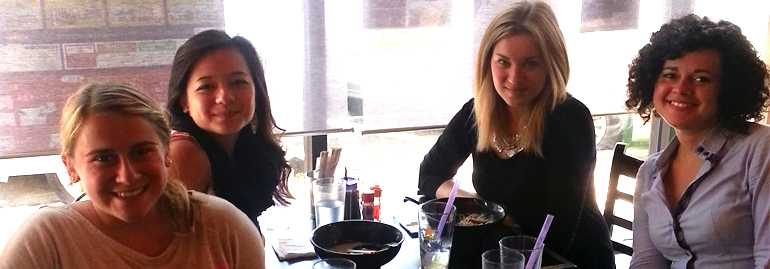
This post was written by Fjorela Dardha our Marketing intern from Bolzano Italy through the M31USA, internship placement program:
I am Fjorela, a student of Masters of Entrepreneurship and Innovation at the Free University of Bolzano in Italy. As part of a project funded by the European Social Fund, I was given the unique opportunity to visit Silicon Valley for six weeks in order to get an insight into ways of doing business in the world leading hub for high-tech innovation.
In particular, I had the chance to do a month-long internship in the Marketing department at FirstRain. From the very beginning, I was warmly accommodated and walked through the team’s overall responsibilities and upcoming projects. What really impressed me was how much people cared to make sure my experience in this start-up would be as beneficial as possible. They involved me in different meetings and group activities and were always asking about what I was doing in Italy, curious to hear about my impressions on the differences between European and American culture.
FirstRain is characterized by a very flat organizational structure and the team appears to be enthusiastically committed to a common goal while making the working environment a great and fun place to be in. I felt that particular attention was given to diversity, which is seen as a valuable component and is reflected in the team composition. I was unexpectedly invited to celebrate the end of their financial quarter, which offered me the unique opportunity to witness how much passion and love people can feel for what they are doing while still finding time to have fun among colleagues. During the party, I had the chance to eat and drink with the whole company, getting to meet people from all over the United States. I even got involved in a Sumo Wrestling match! “It’s an intern tradition” – they said…
Overall I consider this experience to have been extremely valuable and positive both from an educational and personal perspective. I had the opportunity to learn new tools such as Salesforce, which may turn out to be useful for my future career, and got an extensive picture of how start-ups work in the Bay Area. Moreover I was able to get some insights and real life examples of management in highly innovative environments as start-ups tend to be, where the decision making process is very quick and people have to constantly adapt to new circumstances. I consider myself very lucky for having been part of such a great and motivated team and for having had the occasion to create contacts and discover potential future career opportunities.

Yesterday, CEO Penny Herscher took the stage on the Women of the Channel West’s Power Panel with other female leaders in the tech industry: VMWare’s Laurie Evans, Symantec’s Jana Valenti and Google’s Francine Geller, to help women understand what the next big trends are in tech, and what they need to know so they can best position themselves for success.
While each woman had a different take on what the most important skill would be going forward—financial fluency, coding, or something else—they all agreed that it was important to be as well-rounded as possible. Each one of the panelists stated that their companies don’t want someone who is specific to one skill—they want a generalist. Lay a good foundation and it’s easier to climb farther.
They strongly emphasized having a plan, but being flexible enough to roll with the punches. Laurie Evans put it beautifully when she said, “Have a plan. But if life zigzags, that’s OK—just hang on for the ride.” All of the zigs and zags will give you the experience you need to both decide what it is that you want to do, and prepare you for anything that may come your way. Find strong mentors and form partnerships that will endure no matter the twists and turns.
Their advice boiled down to a few powerful statements: Articulate your vision. Enlist allies. Remain fully present. Be joyful. Be authentic.
